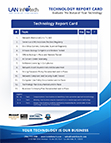Don’t Ignore NIST for Your Technology Needs
The National Institute of Standards and Technology (NIST) is the government agency in the Department of Commerce responsible for the oversight of technology standards – just like its name indicates. Since technology is such a broad term, what exactly does NIST do?
NIST was formed to ensure the U.S. encouraged innovation and modern ideas, with the ultimate goal of remaining competitive against international economic rivals, including Germany and China. While NIST was formed more than a century ago, its fundamental goal remains unchanged: drive innovation in technology.
Innovative inventions using technology since the formation of NIST include a vast list, including modern developments like space exploration and the iPhone. NIST plays a critical role by establishing standards by which businesses should comply to maintain a quality product.
What Is NIST 800-171?
NIST covers some pretty broad technology territory, and releases publications to address specific topics, like NIST 800-171, a special publication released in 2015 to address controlled unclassified information (CUI).
Controlled unclassified information is data that is considered sensitive to the interests of the United States but not so sensitive that it needs to be considered classified – information that is deemed restricted and only available to those who “need to know”.
So, what’s so important about CUI that it gets a special publication? The main thing to know about CUI and NIST 800-171 is that this information needs tighter cyber security protocols, but what does that mean?
What Does NIST 800-171 Mean for Your Data?
NIST 800-171 details minimum security requirements for CUI, focusing on how this data is stored, accessed, and shared. Businesses that meet compliance requirements for NIST 800-171 standards are not only ensuring CUI is protected, but benefitting from an overall heightened data security environment. In fact, the driving factor behind NIST 800-171 was in response to large, well-publicized data breaches.
Protection standards outlined in NIST 800-171 represent four general technology areas:
- Information management and cyber security protocols
- Processes for monitoring IT systems and networks
- Controls concerning accessing and/or using CUI
- Physical and technological security measures
How Does Your Business Become NIST 800-171 Compliant?
If you’ve already identified which data is CUI, your next step is to determine all locations this data is stored or accessed. If you haven’t already identified which data is CUI, you have only one additional step. Depending on how much of your data is CUI, it may be more helpful for you to categorize and separate this data for organization and security compliance purposes.
You’ll want to encrypt this data, track and log all access to CUI, and both establish and reinforce formal policies on training so all matters concerning storage, access, and sharing of CUI is consistent.
Becoming NIST 800-171 compliant is a detailed process but well worth it. Compliance protects CUI, but these added security measures safeguard your network and IT environment, adding protective armor to your business and preventing unauthorized access to CUI and data leaks.
Become NIST 800-171 compliant and protect your CUI today.

LAN Infotech is a Microsoft Cloud Services Provider, IT Managed Support company and a leader in helping law firms, nonprofits and medical organizations deploy cloud solutions, manage computer networks, keep data protected and top technology management company. Businesses like yours need technology support to run highly-effective organizations.


